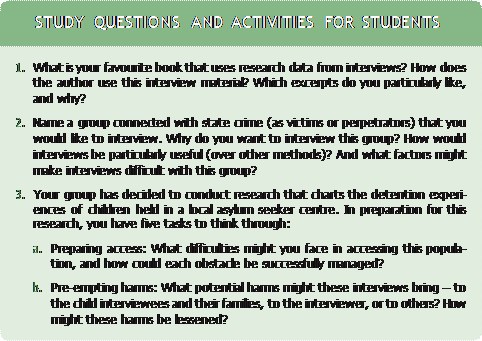 |
Summary and review
|
|
|
|
Interviewing is a qualitative method that has to be undertaken with a certain degree of foresight and care. For this author, interviewing is an academic endeavour but it also reflects a personal, social and political need to recognize violence in its many forms, to demonstrate empathy for others, and to call for change in the treatment of those made less powerful by state actions (Cohen, 2001).
As this chapter has illustrated, interviewing around these topics is not particularly quick or simple; however, it has the potential to rewrite histories in a way that is individually and socially meaningful. Doing interviews with those whose stories are generally overlooked allowed me to present a startling account of state ‘care’, and it demonstrated the clear links between state harms against children and long-term negative legacies for victims, their families and communities (Stanley, 2016).
As a critical criminologist, the opportunity to analyse state power in a way that can shift perceptions or actions is a key driver for pursuing research. Yet, these activities bring personal costs and responsibilities. For instance, among other things, I had to face the emotional, social and political impacts of the work, and acknowl- edge some of the project’s weaknesses, such as its inability to secure more stories from women, Mā ori and other minorities.
In short, there are always implications of requesting interviews. As criminological researchers, those we interview will almost invariably speak about events or issues that bring tension, confusion, pain or trauma. We have a duty to ensure that we respectfully establish, hear and use these stories. This chapter has detailed that:
· There are significant differences between the types of interviews conducted by social researchers.
· Interviewers always have to be attentive to the power differentials between inter- viewer and interviewee.
· Storytelling allows interviewees to guide the narrative on particular issues or situa- tions. This diminishes the control of interviewers in setting the boundaries of debate.
· Interviews are particularly useful to researchers who wish to expose perceptions and experiences of violence, inequality, discrimination or marginalization – for this reason, interviews are often undertaken by critical, feminist and decolonizing criminologists.
· Doing interviews brings a responsibility to use the resulting data in a respectful
way.
· Interviews can often be undertaken as one part of ‘multi-method’ research projects.
· The practice of ‘doing interviews’ can bring multiple challenges of access, trust building, language, emotionality and research dissemination. There are both short- and long-term implications of doing interviews, for the interviewer and the interviewee, among others.
· Interviews can generate significant ‘truths’ about social life that cannot be secured
through other primary research practices. Interviews expose the myths, com- plexities, nuances and commonalities of experiencing harm and violence. Interviews also ‘work’ for diverse groups of people, especially for those from whom we do not commonly hear.
|
|
|
 | |||
 | |||




Brinkmann, S. and Kvale, S. (2015) InterViews: Learning the Craft of Qualitative Research Interviewing, 3rd edition. Los Angeles, CA: Sage.
Butler, J. (2004) Precarious Life: The Powers of Mourning and Violence. New York: Verso.
Chadwick, K. and Scraton, P. (2001) ‘Critical research’, in E. McLaughlin and J. Muncie (eds), The Sage Dictionary of Criminology. London: Sage.
Clough, P. and Nutbrown, C. (2002) A Student’s Guide to Methodology. London: Sage. Cohen, S. (2001) State of Denial: Knowing about Atrocities and Suffering. Cambridge:
Polity Press.
Davies, P. (2000) ‘Doing interviews with female offenders’, in V. Jupp, P. Davies and
P. Francis (eds), Doing Criminological Research. London: Sage.
Farmer, P. (2003) Pathologies of Power: Health, Human Rights and the New War on the Poor. Berkeley, CA: University of California Press.
Giroux, H. A. (2002) ‘Global capitalism and the return of the garrison state’, Arena Journal, 19: 141–60.
Green, P. (2003) ‘Researching the Turkish state’, in S. Tombs and D. Whyte (eds), Unmasking the Crimes of the Powerful: Scrutinizing States and Corporations. New York: Peter Lang.
Hesse-Biber, S. N. and Leavy, P. L. (2013) Feminist Research Practice: A Primer, 2nd edition. London: Sage.
Hollway, W. and Jefferson, T. (2000) Doing Qualitative Research Differently. London: Sage. Huggins, M. K. and Glebbeek, M. (2003) ‘Women studying violent male institutions: cross- gendered dynamics in police research on secrecy and danger’, Theoretical Criminology,
7(3): 363–87.
Jewkes, Y. (2008) ‘Men behind bars’, in Y. Jewkes (ed. ), Prisons and Punishment: Punishment, Controversial Issues and Emerging Debates, Vol. 3. London: Sage.
Kelly, L. (1988) Surviving Sexual Violence. London: Polity Press. Kvale, S. (2007) Doing Interviews. London: Sage.
Lambert, C., Pickering, S. and Alder, C. (2003) Critical Chatter: Women and Human Rights in South East Asia. Durham, NC: Carolina Academic Press.
Lasslett, K. (2014) State Crime on the Margins of Empire. London: Pluto Press.
Laub, D. (1992) ‘An event without a witness: truth, testimony and survival’, in S. Felman and D. Laub (eds), Testimony: Crises of Witnessing in Literature, Psychoanalysis, and History. London: Routledge.
Lumsden, K. and Winter, A. (2014) ‘Reflexivity in criminological research’, in K. Lumsden and A. Winter (eds), Reflexivity in Criminological Research: Experiences with the Powerful and the Powerless. London: Palgrave.
Medlicott, D. (2001) Surviving the Prison Place: Narratives of Suicidal Prisoners. Aldershot: Ashgate.
Middleton, W., Stavropoulos, P., Dorahy, M., Kruger, C., Lewis-Fernandez, R., Martinez- Taboas, A., et al. (2014) ‘The Australian Royal Commission into Institutional Responses to Child Sexual Abuse’, Australian and New Zealand Journal of Psychiatry, 48(1): 17–21.
 Pickering, S. (2001) ‘Undermining the sanitized account: violence and emotionality in the field in Northern Ireland’, British Journal of Criminology, 41: 485–501.
Pickering, S. (2001) ‘Undermining the sanitized account: violence and emotionality in the field in Northern Ireland’, British Journal of Criminology, 41: 485–501.
|
|
|
Plummer, K. (2001) Documents of Life 2: An Invitation to a Critical Humanism. London: Sage.
Rosenthal, G. (2003) ‘The healing effects of storytelling: on the conditions of curative storytelling in the context of research and counseling’, Qualitative Inquiry, 9(6): 915–33.
Scraton, P. (1999) Hillsborough: The Truth. Edinburgh: Mainstream Publishing. Scraton, P. (2007) Power, Conflict and Criminalisation. London: Routledge.
Sim, J. (2003) ‘Whose side are we not on? Researching medical power in prisons’, in
S. Tombs and D. Whyte (eds), Unmasking the Crimes of the Powerful: Scrutinizing States and Corporations. New York: Peter Lang.
Skeggs, B. (2002) ‘Techniques for telling the reflexive self’, in T. May (ed. ), Qualitative Research in Action. London: Sage.
Smale, A. (2016) ‘Justice delayed, justice denied’, Radio NZ, 9 December. Available at: www. radionz. co. nz/stories/201825742/justice-delayed-justice-denied (accessed 17
August 2017).
Smith, L. T. (2003) Decolonizing Methodologies: Research and Indigenous Peoples. London: Zed Books.
Stanley, E. (2012) ‘Interviewing victims of state violence’, in D. Gadd, S. Karstedt and S. F. Messner (eds), The Sage Handbook of Criminological Research Methods. London: Sage. Stanley, E. (2015) ‘Responding to state institutional violence’, British Journal of Criminology,
55(6): 1149–67.
Stanley, E. (2016) The Road to Hell: State Violence against Children in Postwar New Zealand. Auckland: Auckland University Press.
Stringer, R. (2014) Knowing Victims: Feminism, Agency and Victim Politics in Neoliberal Times. London: Routledge.
Tener, D. and Murphy, S. (2015) ‘Adult disclosure of child sexual abuse: a literature review’,
Trauma, Violence and Abuse, 16(4): 391–400.
Walklate, S. (2011) ‘Reframing criminal victimization: finding a place for vulnerability and resilience’, Theoretical Criminology, 15(2): 179–94.

|
|
|


